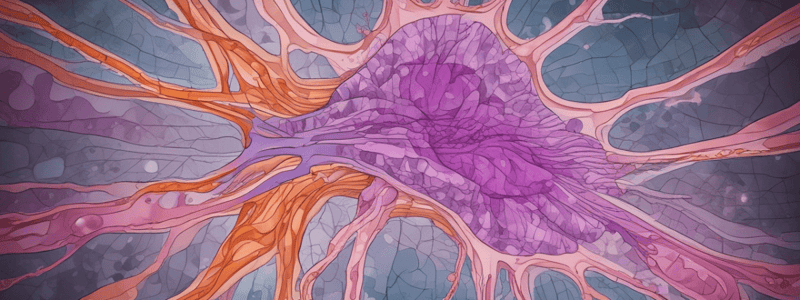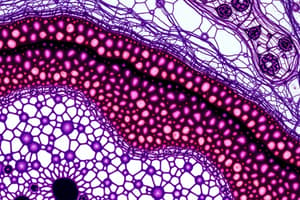Podcast
Questions and Answers
What is the primary purpose of a cytologist examining cells obtained from body tissue or fluid?
What is the primary purpose of a cytologist examining cells obtained from body tissue or fluid?
- To study the function of cells in terms of chemistry
- To identify the type of stain used in cytology
- To look for cancerous changes to cells (correct)
- To examine the structure of cells
What type of cytology specimen is obtained from the respiratory, urinary, or gastro-intestinal systems?
What type of cytology specimen is obtained from the respiratory, urinary, or gastro-intestinal systems?
- Non-gynaecological (correct)
- Gynaecological
- Fine needle aspirations
- Cervical smears
What is the name of the staining technique that involves five dyes in three solutions?
What is the name of the staining technique that involves five dyes in three solutions?
- Romanowsky-type stain
- Giemsa stain
- Papanicolaou stain (correct)
- Hematoxylin and Eosin stain
What is the purpose of using Harris' hematoxylin in the Papanicolaou staining technique?
What is the purpose of using Harris' hematoxylin in the Papanicolaou staining technique?
What is the name of the type of cytology specimen that includes any site from which a clinician can obtain a specimen using a fine needle?
What is the name of the type of cytology specimen that includes any site from which a clinician can obtain a specimen using a fine needle?
What is the name of the stain used to differentiate cells for microscopic examination in pathological studies?
What is the name of the stain used to differentiate cells for microscopic examination in pathological studies?
What is the name of the collection device used to collect cervical smears?
What is the name of the collection device used to collect cervical smears?
What is the minimum number of years that slides must be kept in cytology?
What is the minimum number of years that slides must be kept in cytology?
What is the term for the study of cells in terms of structure, function, and chemistry?
What is the term for the study of cells in terms of structure, function, and chemistry?
What is the purpose of increasing the temperature of fixation?
What is the purpose of increasing the temperature of fixation?
What is the recommended minimum time for fixation of a 4 mm piece of tissue?
What is the recommended minimum time for fixation of a 4 mm piece of tissue?
Which of the following fixatives is commonly used for electron microscopy?
Which of the following fixatives is commonly used for electron microscopy?
What is the primary purpose of the gross description in histology?
What is the primary purpose of the gross description in histology?
What is the purpose of the cassette labeler in histology?
What is the purpose of the cassette labeler in histology?
What is the purpose of the dehydration step in tissue processing?
What is the purpose of the dehydration step in tissue processing?
What is the purpose of the clearing step in tissue processing?
What is the purpose of the clearing step in tissue processing?
What is the typical temperature at which paraffin wax is infiltrated into tissue?
What is the typical temperature at which paraffin wax is infiltrated into tissue?
What is the purpose of adding additives to paraffin wax?
What is the purpose of adding additives to paraffin wax?
What is the primary function of the histology department?
What is the primary function of the histology department?
What is the purpose of fixation in histology?
What is the purpose of fixation in histology?
What is the common brand name of the paraffin wax used in the embedding process?
What is the common brand name of the paraffin wax used in the embedding process?
What is the temperature of the embedding oven in the wax infiltration step?
What is the temperature of the embedding oven in the wax infiltration step?
What is the most common fixative used in histology?
What is the most common fixative used in histology?
What is the advantage of using 10% N.B. formalin as a fixative?
What is the advantage of using 10% N.B. formalin as a fixative?
What is the purpose of adding an external base to the tissue during the embedding process?
What is the purpose of adding an external base to the tissue during the embedding process?
How is 10% formalin prepared?
How is 10% formalin prepared?
What is the thickness of the sections cut on a microtome?
What is the thickness of the sections cut on a microtome?
What is the purpose of the hot water bath in the staining process?
What is the purpose of the hot water bath in the staining process?
What is the difference between formaldehyde and formalin?
What is the difference between formaldehyde and formalin?
What is the solvent used to remove wax from the sections during the staining process?
What is the solvent used to remove wax from the sections during the staining process?
Why is it necessary to add a buffer to formalin?
Why is it necessary to add a buffer to formalin?
What is the purpose of the dehydration step in the permanent mounting process?
What is the purpose of the dehydration step in the permanent mounting process?
What is the ideal ratio of fixative to specimen volume?
What is the ideal ratio of fixative to specimen volume?
What is the advantage of using frozen sections over paraffin wax embedding?
What is the advantage of using frozen sections over paraffin wax embedding?
What is the order of steps in preparing histological sections?
What is the order of steps in preparing histological sections?
What should you do with small amounts of ethyol alcohol?
What should you do with small amounts of ethyol alcohol?
What is the primary purpose of the cytocentrifuge?
What is the primary purpose of the cytocentrifuge?
What is the purpose of the ThinPrep 2000 processor?
What is the purpose of the ThinPrep 2000 processor?
What is the role of a Medical Laboratory Assistant (MLA) in histology?
What is the role of a Medical Laboratory Assistant (MLA) in histology?
What is the purpose of Histogel in cell block preparation?
What is the purpose of Histogel in cell block preparation?
What is the purpose of the supernatant removal in cell block preparation?
What is the purpose of the supernatant removal in cell block preparation?
What is the role of a Medical Laboratory Assistant (MLA) in cytology?
What is the role of a Medical Laboratory Assistant (MLA) in cytology?
What is the purpose of securely tightening the cap on the vial?
What is the purpose of securely tightening the cap on the vial?
What is the purpose of the Cytology fixed spray?
What is the purpose of the Cytology fixed spray?
What is the purpose of placing the specimen block on tissue paper?
What is the purpose of placing the specimen block on tissue paper?
Flashcards are hidden until you start studying
Study Notes
Histology and Cytology
Purpose of Histology Department
- Prepare slides of tissue from various sources for pathologist examination
Preparation of Histological Sections
- Steps:
- Preserve tissue (fixation)
- Embed tissue in supporting medium
- Sectioning
- Staining
Fixation
- Purpose: preserve tissue, prevent structural change
- Fixative: 10% Neutral Buffered (N.B.) Formalin
- Characteristics of Formalin:
- Cheap
- Rapidly penetrates tissue
- Preserves natural state
- Made by mixing 40% Formaldehyde with 100ml water
- To get 10% Formalin, mix 10ml of 100% Formalin with 90ml water
Factors Affecting Fixation
- Temperature: increases rate of fixation
- Time: longer time generally better
- Penetration rate: depends on fixative
- Specimen dimensions: 1-4 mm thickness
Other Fixatives
- Bouin's solution: picric acid
- Zenker's fixative: mercuric chloride
- Glutaraldehyde: electron microscopy
- Alcohols: good for cytology
Tissue Processing
- Steps:
- Dehydration (removal of water using ascending series of alcohols)
- Clearing (using xylene to displace ethanol)
- Wax infiltration (paraffin wax)
- Can be done manually or by machine (HistoCore PELORIS 3 Premium Tissue Processing System)
Embedding
- Purpose: stabilize tissue with external base
- Process: place tissue in mold, add hot wax, and cool to form a wax block
Microtomy
- Process: cut sections of tissue embedded in wax block using a microtome
- Thickness: 3-5 um
Staining
- Most common stain: Hematoxylin and Eosin (H&E)
- Steps:
- Remove wax using xylene
- Hydrate sections using descending alcohols and water
- Stain with Hematoxylin and Eosin
Permanent Mounting
- Steps:
- Dehydrate sections using ascending alcohols
- Clear using xylene
- Mount with a mountant (e.g. Permount) and glass coverslip
Cytology
- Definition: study of cells in terms of structure, function, and chemistry
- Objectives:
- Different types of cytology specimens
- Procedures used in cytology
- Common stains used in cytology
- Papanicolaou stain
Types of Cytology Specimens
- Gynaecological (cervical cancer)
- Non-gynaecological (respiratory, urinary, gastro-intestinal systems)
- Fine needle aspirations (breast, lung, salivary glands, etc.)
Stains Used in Cytology
- Papanicolaou stain (for nuclear details)
- Romanowsky-type stain (for acid-fast bacteria)
Papanicolaou Stain
- Five dyes in three solutions:
- Hematoxylin (nuclear stain)
- Orange Green 6 (acidic counterstain)
- Eosin Azure (counterstain)
- Eosin Y (cytoplasmic stain)
- Light green SF (cytoplasmic stain)
Specimen Preparation
- Various methods:
- Cytocentrifugation preparation (Cytospin)
- ThinPrep preparation (mainly for cervical smears)
- Cell block preparation (captures remaining specimen in centrifuge tube)
Role of a MLA in Histology/Cytology
- Prepares specimens for histology
- Labels tissue cassettes
- Performs routine tissue processor maintenance and reagent changes
- Files and retrieves stained slides and paraffin blocks
- Performs routine staining procedures
- Mounts slides
- Assists in the cutting room
- Prepares specimens for cytology
- Stains and mounts pap slides
Studying That Suits You
Use AI to generate personalized quizzes and flashcards to suit your learning preferences.




